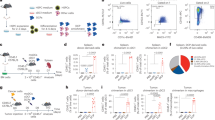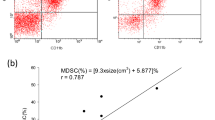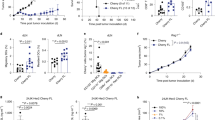Abstract
Clinical cancer gene therapy trials have generally focused on the transfer of cytokine cDNA to tumor cells ex vivo and with the subsequent vaccination of the patient with these genetically altered tumor cells. This approach results in high local cytokine concentrations that may account for the efficacy of this technique in animal models. We hypothesized that the expression of certain cytokines by tumor cells would be a superior immune stimulant when compared with local delivery of exogenous cytokines. Granulocyte-macrophage colony-stimulating factor (GM-CSF) cDNA in a nonviral expression vector was inserted into MDA-MB-231 (human breast cancer), M21 (human melanoma), B16 (murine melanoma), and P815 (mastocytoma) cells by particle-mediated gene transfer. The ability of transfected tumor cells to generate a tumor-specific immune response was evaluated in an in vitro mixed lymphocyte-tumor cell assay and in an in vivo murine tumor protection model. Peripheral blood lymphocytes cocultured with human GM-CSF-transfected tumor cells were 3- to 5-fold more effective at lysis of the parental tumor cells than were peripheral blood lymphocytes incubated with irradiated tumor cells and exogenous human GM-CSF. Mice immunized with murine GM-CSF-transfected irradiated B16 murine melanoma cells or P815 mastocytoma cells were protected from subsequent tumor challenge, whereas mice immunized with the nontransfected tumors and cutaneous transfection of murine GM-CSF cDNA at the vaccination site developed tumors more frequently. The results indicate that GM-CSF protein expressed in human and murine tumor cells is a superior antitumor immune stimulant compared with exogenous GM-CSF in the tumor microenvironment.
This is a preview of subscription content, access via your institution
Access options
Subscribe to this journal
Receive 12 print issues and online access
$259.00 per year
only $21.58 per issue
Buy this article
- Purchase on Springer Link
- Instant access to full article PDF
Prices may be subject to local taxes which are calculated during checkout
Similar content being viewed by others
Author information
Authors and Affiliations
Rights and permissions
About this article
Cite this article
Shi, FS., Weber, S., Gan, J. et al. Granulocyte-macrophage colony-stimulating factor (GM-CSF) secreted by cDNA-transfected tumor cells induces a more potent antitumor response than exogenous GM-CSF. Cancer Gene Ther 6, 81–88 (1999). https://doi.org/10.1038/sj.cgt.7700012
Received:
Accepted:
Published:
Issue Date:
DOI: https://doi.org/10.1038/sj.cgt.7700012
Keywords
This article is cited by
-
Knockdown expression of a MYB-related transcription factor gene, OsMYBS2, enhances production of recombinant proteins in rice suspension cells
Plant Methods (2021)
-
Comparative antitumor effect among GM-CSF, IL-12 and GM-CSF+IL-12 genetically modified tumor cell vaccines
Cancer Gene Therapy (2013)
-
Combination immunotherapy and active-specific tumor cell vaccination augments anti-cancer immunity in a mouse model of gastric cancer
Journal of Translational Medicine (2011)
-
Development of a successful antitumor therapeutic model combining in vivo dendritic cell vaccination with tumor irradiation and intratumoral GM-CSF delivery
Cancer Immunology, Immunotherapy (2011)
-
Chitosan hydrogel containing GMCSF and a cancer drug exerts synergistic anti-tumor effects via the induction of CD8+ T cell-mediated anti-tumor immunity
Clinical & Experimental Metastasis (2009)



